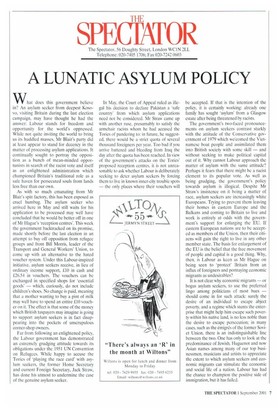SPE i dATOR
The Spectator, 56 Doughty Street, London WC1N 2LL Telephone: 020-7405 1706; Fax 020-7242 0603
A LUNATIC ASYLUM POLICY
What does this government believe in? An asylum seeker from deepest Kosovo, visiting Britain during the last election campaign, may have thought he had the answer: Labour stands for freedom and opportunity for the world's oppressed. While not quite inviting the world to bring us its huddled masses, Mr Blair's party did at least appear to stand for decency in the matter of processing asylum applications. It continually sought to portray the opposition as a bunch of mean-minded opportunists in search of the racist vote and itself as an enlightened administration which championed Britain's traditional role as a safe haven for persecuted souls from lands less free than our own.
As with so much emanating from Mr Blair's spin factory, this has been exposed as cruel humbug. The asylum seeker who arrived here in May and still waits for his application to be processed may well have concluded that he would be better off in one of Mr Hague's 'reception centres'. This week the government backtracked on its promise, made shortly before the last election in an attempt to buy off opposition from refugee groups and from Bill Morris, leader of the Transport and General Workers' Union, to come up with an alternative to the hated voucher system. Under this Labour-inspired initiative, asylum seekers receive, in lieu of ordinary income support, £10 in cash and £26.54 in vouchers. The vouchers can be exchanged in specified shops for 'essential goods' — which, curiously, do not include children's shoes. No change is paid, meaning that a mother wanting to buy a pint of milk may well have to spend an entire £10 voucher on it. The effect is that some of the money which British taxpayers may imagine is going to support asylum seekers is in fact disappearing into the pockets of unscrupulous corner-shop owners.
Far from following an enlightened policy, the Labour government has demonstrated an extremely grudging attitude towards its obligations under the 1951 UN Convention on Refugees. While happy to accuse the Tories of 'playing the race card' with asylum seekers, the former Home Secretary and current Foreign Secretary, Jack Straw, has done his utmost to undermine the case of the genuine asylum seeker.
In May, the Court of Appeal ruled as illegal his decision to declare Pakistan a 'safe country' from which asylum applications need not be considered. Mr Straw came up with another ruse, presumably to satisfy the armchair racists whom he had accused the Tories of pandering to: in future, he suggested, there would be a strict quota of several thousand foreigners per year. Too bad if you arrive battered and bleeding from Iraq the day after the quota has been reached. In view of the government's attacks on the Tories' proposed reception centres, it is not unreasonable to ask whether Labour is deliberately seeking to deter asylum seekers by forcing them to live in known inner-city trouble spots
the only places where their vouchers will be accepted. If that is the intention of the policy, it is certainly working: already one family has sought 'asylum' from a Glasgow estate after being threatened by racists.
The government's two-faced pronouncements on asylum seekers contrast starkly with the attitude of the Conservative government of 1979 which welcomed the Vietnamese boat people and assimilated them into British society with some skill — and without seeking to make political capital out of it. Why cannot Labour approach the matter of asylum with the same attitude? Perhaps it fears that there might be a racist element to its popular vote. As well as being grudging, the government's policy towards asylum is illogical. Despite Mr Straw's insistence on it being a matter of race, asylum seekers are increasingly white Europeans. Trying to prevent them leaving their homes in eastern Europe and the Balkans and coming to Britain to live and work is entirely at odds with the government's support for enlarging the EU. If eastern European nations are to be accepted as members of the Union, then their citizens will gain the right to live in any other member state. The basis for enlargement of the EU is the belief that the free movement of people and capital is a good thing. Why, then, is Labour as keen as Mr Hague on being seen to 'protect' Britain from an influx of foreigners and portraying economic migrants as undesirables?
It is not clear why economic migrants — or bogus asylum seekers, to use the preferred lingo among politicians of most hues — should come in for such attack: surely the desire of an individual to escape abject poverty, and a regime which stunts the enterprise that might help him escape such poverty within his native land. is no less noble than the desire to escape persecution; in many cases, such as the émigrés of the former Soviet Union, there is an indistinguishable line between the two. One has only to look at the predominance of Jewish, Huguenot and now Asian names among many of our top businessmen, musicians and artists to appreciate the extent to which asylum seekers and economic migrants can stimulate the economic and social life of a nation. Labour has had the chance to champion the positive side of immigration, but it has failed.


























































 Previous page
Previous page